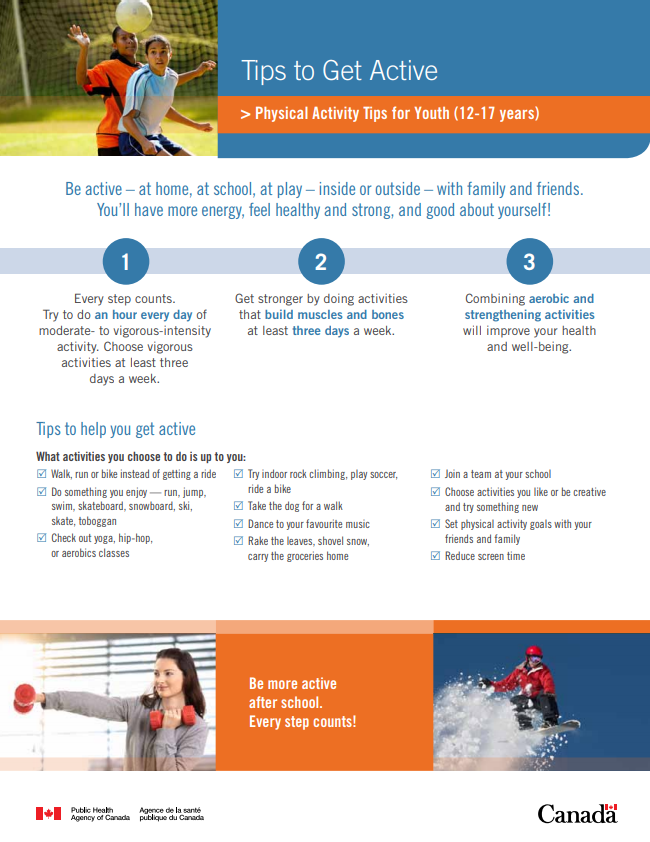Physical Activity Tips for Youth (12-17 years)

Download the alternative format
(PDF Document - 355 KB - 2 pages)
Tips to Get Active
Be active - at home, at school, at play - inside or outside-with family and friends. You'll have more energy, feel healthy and strong, and good about yourself!
- Every step counts. Try to do an hour every day of moderate- to vigorous-intensity activity. Choose vigorous activities at least three days a week.
- Get stronger by doing activities that build muscles and bones at least three days a week.
- Combining aerobic and strengthening activities will improve your health and well-being.
Tips to help you get active
What activities you choose to do is up to you:
- Walk, run or bike instead of getting a ride
- Do something you enjoy - run, jump, swim, skateboard, snowboard, ski, skate, toboggan
- Check out yoga, hip-hop, or aerobics classes
- Try indoor rock climbing, play soccer, ride a bike
- Take the dog for a walk
- Dance to your favourite music
- Rake the leaves, shovel snow, carry the groceries home
- Join a team at your school
- Choose activities you like or be creative and try something new
- Set physical activity goals with your friends and family
- Reduce screen time
Be more active after school. Every step counts!
Health Benefits
- Meet new friends
- Do better at school
- Increase your concentration
- Improve your self-esteem
- Build stronger bones and muscles
- Improve your mental health
- Improve your fitness
- Improve your posture and balance
- Reduce your stress
- Have a strong heart
- Helps with healthy growth and development
Adding more physical activity to your day improves your health, and it's fun.
What is moderate aerobic activity?
Moderate-intensity aerobic activity makes you breathe harder and your heart beat faster. You should be able to talk, but not sing.
- Examples of moderate-intensity physical activity include walking quickly, skating, bike riding and skateboarding.
What is vigorous aerobic activity?
With vigorous-intensity aerobic activity, your heart rate will increase even more and you will not be able to say more than a few words without catching a breath.
- Examples of vigorous activity include running, basketball, soccer and cross-country skiing.
What are strengthening activities?
Muscle-strengthening activities build up your muscles. With bone-strengthening activities, your muscles push and pull against your bones, helping make your bones stronger.
- Examples of muscle-strengthening activities include doing push-ups and sit-ups, lifting weights, climbing stairs and riding a bike.
- Examples of bone-strengthening activities include running, walking, yoga and jumping rope.
Combine aerobic and strengthening activities
To achieve health benefits, children need to do both aerobic and strengthening activities. Aerobic activities result in faster breathing, a warmer feeling and an increased heart rate. Strengthening activities build muscles and bones.
Get them active after school
After school is a great time to be physically active. Sign up for active programs, and if possible find active ways to get home from school. Make time to be active every day.
Canadian Physical Activity Guidelines were developed by the Canadian Society for Exercise Physiology.